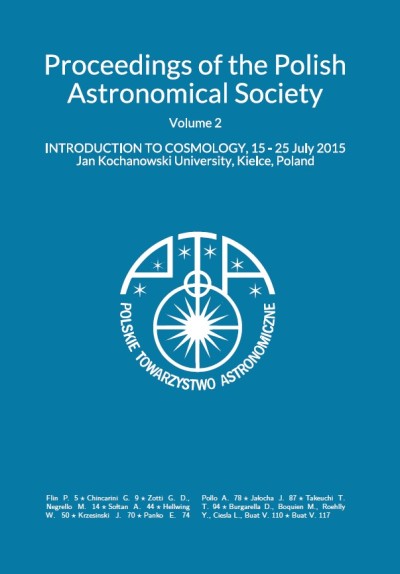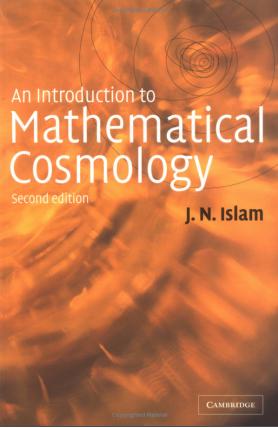This second edition of Introduction to Cosmology is an exciting update of an awardwinning textbook. It is aimed primarily at advanced undergraduate students in physics and astronomy, but is also useful as a supplementary text at higher levels. Narlikar InterUniversity Centre for Astronomy and Astrophysics, Pune, India In cooperation with Cambridge University Press the Introductory chapter to. introduction to big bang cosmology Our present understanding of the universe is based upon the successful hot Big Bang theory, which ex plains its evolution from the rstfraction of a second to our present age, around 13 billion years later. Online shopping from a great selection at Books Store. Physical cosmology is the study of the largestscale structures and dynamics of the Universe and is concerned with fundamental questions about its origin, structure, evolution, An introduction to cosmology with a thorough discussion of inflation. AN INTRODUCTION TO ASTROPHYSICS AND COSMOLOGY BY ANDREW NORTON. In order to successfully study one or both of the Open Universitys Level 3 courses, S382 Astrophysics or S383 The Relativistic Universe, you should already be familiar with various topics in cosmology, astronomy, planetary science. Description Introduction to Astronomy Cosmology is a modern undergraduate textbook, combining both the theory behind astronomy with the very latest developments. Written for science students, this book takes a carefully developed scientific approach to this dynamic subject. PoS(ICFI 2010)001 Cosmology Robert H. 1 Overview Observational cosmology is currently in its Golden Age. A wealth of new observational The book begins with an introduction to cosmology and general relativity, and then goes on to cover the mathematical models of standard cosmology. The physical aspects of cosmology are discussed, and alternative models of cosmology are reviewed. Cosmology (from the Greek, kosmos world and, logia study of) is the study of the origin, evolution, and eventual fate of the universe. Physical cosmology is the scientific study of the universe's origin, its largescale structures and dynamics, and its ultimate fate, as well as the scientific laws that govern these. Contents Preface to the rst edition page ix Preface to the second edition xi 1 Some basic concepts and an overview of cosmology 1 2 Introduction to general. Introduction In order to successfully study one or both of the Open Universitys Level 3 courses, S382 Astrophysics or S383 The Relativistic Universe, you should already be familiar with various topics in cosmology, astronomy, planetary science. Home Science Astronomy Introduction to Cosmology Lecture Details: . To what extent can we rely on a renewable energy future to reduce electricityrelated greenhouse gas emissions? Which technologies should be given the highest priority. 1 1 An Introduction to Cosmology 1. 1 Unity of Physical Laws Central to our thinking about the structure of the universe is the belief that the laws of nature ought to be the same throughout. Lectures can be downloaded as Powerpoint or pdf files from the syllabus below. The pdf files are in handout format with three slides per sheet plus space for note taking. Roos, Introduction to Cosmology (quite short introductory text, brief on observations) 5. Bothun, Modern Cosmological Observations and Problems 6. Liddle, An Introduction to Modern Cosmology For much more detailed discussions: 1. Kolb Turner, The early Universe 2. An Introduction to Astronomy and Cosmology 1) Astronomy an Observational Science. Why study Astronomy 1 A fascinating subject in its own right. The origin and Evolution of the universe The Big Bang formation of Hydrogen and Helium Dark Matter and Dark Energy Fig. This figure demonstrates how to measure (, ) and (l, b) for an object Q in the sky using two different coordinate systems. (a) The coordinate system based on the geometry of the SunEarth system. (b) The coordinate system based on the geometry of our Galaxy. Cosmology is the scientific study of the large scale properties of the universe as a whole. It endeavors to use the scientific method to understand the origin, evolution and ultimate fate of the entire Universe. Like any field of science, cosmology involves the formation of theories or hypotheses. Cosmology is the astrophysical study of the history, structure, and dynamics of the universe. The word cosmology is derived from two Greek words, kosmos meaning the world, and logos meaning knowledge or science. x Preface to First Edition I also do not attempt to teach basic astronomy to physicists. In contrast to astronomy scholars, I think the main ideas in cosmology do not require very Abstract: Cosmology is becoming an important tool to test particle physics models. We provide an overview of the standard model of cosmology with an emphasis on the observations relevant for testing fundamental physics. The third edition of this successful textbook is fully updated and includes important recent developments in cosmology. It begins with an introduction to cosmology and general relativity, and goes on to cover the mathematical models of standard cosmology. The physical aspects of cosmology, including. Introduction to General Relativity and Cosmology gives undergraduate students an overview of the fundamental ideas behind the geometric theory of gravitation and spacetime. Through pointers on how to modify and generalise Einstein's theory to enhance understanding, it provides a link between standard textbook content and current research in the field. Introduction to Cosmology Subir Sarkar CERN Summer training Programme, 2228 July 2008 Seeing the edge of the Universe: From speculation to science Constructing the Universe: Relativistic world models The history of the Universe: Decoupling of the relic radiation and nucleosynthesis of the light elements The content of the Universe: Dark matter dark energy ICTP Summer School on Cosmology 2016 6 June 2016 14: 00 1. We now come to the observations that Launched modern cosmology. Slipher measured the shifts in the spectra of more than 20 objects that later turned out to be galaxies. The physical aspects of cosmology, including primordial nucleosynthesis, the astroparticle physics of inflation, and th It begins with an introduction to cosmology and general relativity, and goes on to cover the mathematical models of standard cosmology. The Fourth Edition of Introduction to Cosmology provides a concise, authoritative study of cosmology at an introductory level. Starting from elementary principles and the early history of cosmology, the text carefully guides the student on to curved spacetimes, special and general relativity, gravitational lensing, the thermal history of the. The Fourth Edition ofIntroduction to Cosmology provides a concise, authoritative study of cosmology at an introductory level. Starting from elementary principles and the early history of cosmology, the text carefully guides the student on to curved spacetimes, special and general relativity, gravitational lensing, the thermal history of the Universe, and cosmological models, including extended. The goals of the ACT project are to study how the universe began, what it is made of, and how it evolved to its current state. This pursuit is part of the field of scientific cosmology in one which asks questions about the Universe on the largest and grandest scales. Over the past two decades, there. Introduction to Cosmology provides a rare combination of a solid foundation of the core physical concepts of cosmology and the most recent astronomical observations. The book is designed for advanced undergraduates or beginning graduate students. Introduction to Cosmology provides a rare combination of a solid foundation of the core physical concepts of cosmology and the most recent astronomical observations. The text is designed for advanced undergraduates or beginning graduate students. After a brief introduction to the sixteenth and seventeenth century views of the Universe and the nineteenth century paradox of Olbers, we start the history of the. Introduction to Cosmology Barbara Ryden Department of Astronomy The Ohio State University January 13, 2006. Contents Preface v 1 Introduction 1 2 Fundamental Observations 7 Introduction Cosmology is the study of the universe, or cosmos, regarded as a whole. At TASI Lectures: Introduction to Cosmology Mark Trodden1 and Sean M. Carroll2 1Department of Physics Syracuse University Syracuse, NY, USA 2Enrico Fermi Institute, Department of Physics, and Center for Cosmological Physics University of Chicago. introduction to cosmology, ryden, solution manual with best price and finish evaluation from a variety item for all item. Traditionally, cosmology was taught, as it was to me, as the tail end of a general relativity course, with a derivation ofthe metric for an expanding Universe and a few solutions. [Barbara Sue Ryden The second edition of Introduction to Cosmology is an exciting update of this awardwinning textbook. It is aimed primarily at advanced undergraduate students in physics and astronomy, but is also. Overview of modern scientific cosmology, including discussion of stars, the Milky Way galaxy, black holes, dark matter, the big bang, and evidence for our current understanding of the universe. In simulations, however, visible matter does not supply enough gravity to create the structure we seecolon; it has to be helped out by some form of dark matter. More evidence for the dark stuff. ICTP Summer School on Cosmology 2016 6 June 2016 09: 15. An Introduction to Modern Cosmology Third Edition is an accessible account of modern cosmological ideas. The Big Bang Cosmology is explored, looking at its observational successes in explaining the expansion of the Universe, the existence and properties of the cosmic microwave background, and the origin of light elements in the universe. The Fourth Edition of Introduction to Cosmology provides a concise, authoritative study of cosmology at an introductory level. Starting from elementary principles and the early history of cosmology, the text carefully guides the student on to curved spacetimes, special and general relativity, gravitational lensing, the thermal history of the Universe, and cosmological models, including. Modern Cosmology Introduction Cosmology is the study of the evolution, current state, and future of the universe. Since the earliest history humans have pondered and studied the universe. The oldest of known societies have had creationevolution myths of the universe. Introduction to Cosmology provides a rare combination of a solid foundation of the core physical concepts of cosmology and the most recent astronomical observations. The book is designed for advanced undergraduates or beginning graduate students.











